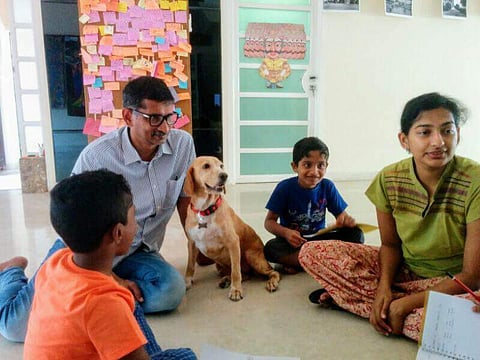

The pandemic has separated the teacher and student with a screen and while virtual classrooms have been working, a lot of the credit also goes to the students because they have to do a lot of the work independently as well. But the folks at Chennai-based The Learning Community at Quest already have a track record for evolving new methodologies based on international standards of self-directed learning. Co-founded by Srikanth Chandrasekaran and Sharanya Dilip in 2016, Quest not only addresses current dilemmas about home-schooling during the pandemic but also assists and inspires families who seek to move away from conventional teaching methodologies altogether. Quest is now offering The Unschooling Project, which offers a complete all-day programme based on self-directed learning.
Excerpts from a conversation:
1. While the term is self-explanatory, could you explain what self-directed learning is?
Self-directed learning (SDL) or self-directed education (SDE) is a growing field supported by educators, psychologists and families around the world, and the methodologies that Quest incorporates are based on the concept of unschooling. Unschooling is a unique approach to education and is best described as non-structured, child-led learning with no set curriculum or schedule. As a self-directed learner, each child takes initiative and responsibility over their own educational experience, with the learning centre providing a holistic environment that supports the same. Tests, homework and other facets of conventional schooling are eliminated in this approach, which focuses on learning and individual growth and encourages the child to set parameters for the same, through planning, implementing and evaluating their own projects. This revolutionary approach has been shown to be successful in raising independent, self-motivated and creative individuals.
2. Could you tell me a little about how the idea of 'Unschooling' took birth and the challenges that you faced in putting the idea together?
The Unschooling Project took shape early 2019 when we were in a discussion with Peter Gray, a research professor of Psychology at Boston College and a specialist in Developmental and Evolutionary Psychology, about learning centres becoming self-directed learning environments. As a researcher who has studied models such as Sudbury and other Liberated Learners and Agile Learning Centres — when he visited Quest and recommended our model and approach to colleagues back home — it was a huge validation for us! To quote him, “I was extraordinarily impressed by what they have developed, which seems to be completely unique in the realm of self-directed education and potentially adaptable everywhere.”
Our own approach to self-directed learning began from a crying need to help children find a sense of belonging and ownership at Quest when they came here for our various programmes. We developed a lot of our processes at a point when the term “self-directed education” was not yet common. But now with the wave of providing agency to children, the amount of access they have in their everyday environments to the internet, it becomes important that we bring together all resources in a manner that is not overwhelming for our learners but rather accessible as bite-sized learning paths that they can choose to take on. We have also designed assessment methods that work as self-assessment tools.
3. Not needing much parental participation is a huge advantage for working parents. How have you managed to make this an important aspect of the project?
We do need parental participation but the frequency is something the parents can decide; also the mode of communication is flexible. We have developed an app called Breadcrumb that helps children document their learning that, over the months, works as a learning timeline of all that they’ve worked on. So at each step of learning, we have weaved in ways in which children take charge of documenting and assessing their own goals and would be able to update their parents themselves. The role of a mentor is to simply ensure the parents feel heard and have a point of contact to address any concerns that they’d like us to be involved in as well.
4. Unschooling is a refreshing approach to learning. While more parents are opening up to the idea of alternate education, it still is a miniscule number in comparison to those who prefer mainstream education. How do you think parents can be encouraged to open up to new, less stressful options?
It’s truly up to the family to want this for their children. Over the last four years, Quest has been a learning hub for all age groups and all types of learners. Those who have been a part of our community would validate how we have curated various learning experiences to bring about maximum engagement and impact. We went from being a community space for families to engage in to hosting summer camps, to having a very successful after-school programme, to now starting The Unschooling Project. At each of these points, our decision to make the effort to create these programmes has entirely been driven by parents seeking it.
5. Alternate education is also perceived as elite. It is almost never an option for students from low income backgrounds. Do you agree? Do you think that will change?
Yes, access and cost is a largely restricting factor. At Quest, we’ve worked on specific projects where we've helped children from the Palavakkam community in Chennai learn Math in a self-paced manner. Through this we learnt how most of them had a steep learning curve and did not miss a single session as they had complete ownership over both the resources as well as their own goals. We see ourselves making a consistent effort in this manner to support and help children in the community once we shift to Besant Nagar as well.
Reach out: questcommunity.in
Every Saturday the team makes a presentation to interested parents about The Unschooling Project to build awareness as well as address any questions parents have. Call +91-7358570749 to sign up for this
